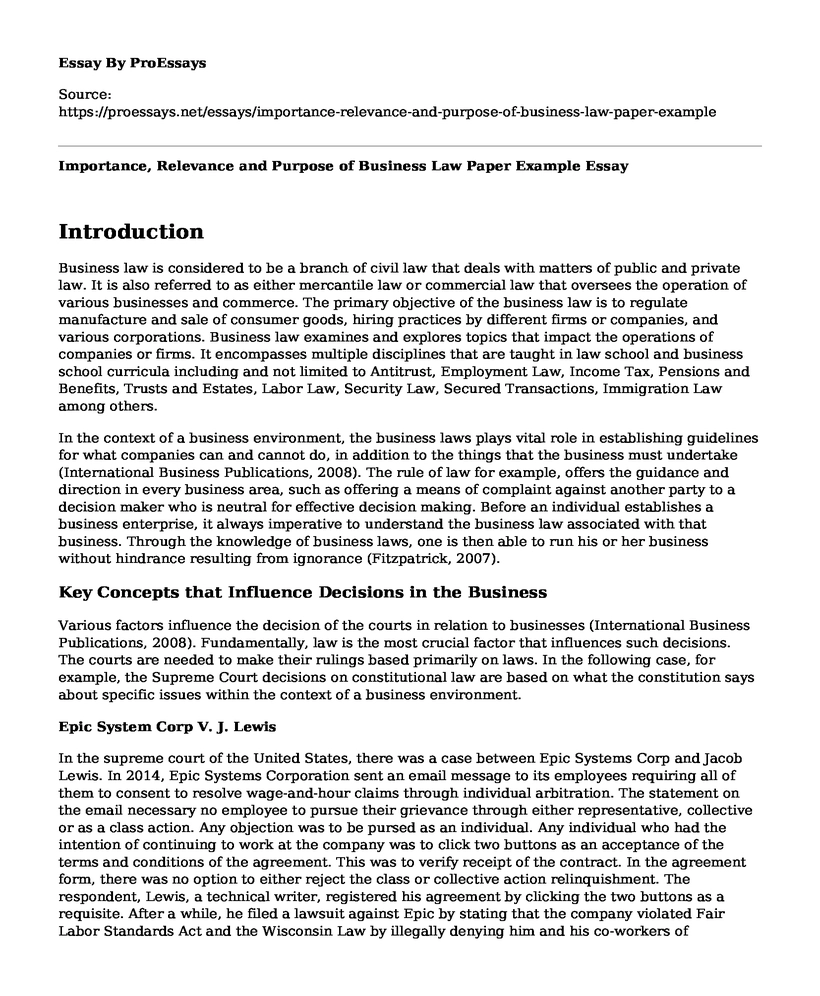Introduction
Business law is considered to be a branch of civil law that deals with matters of public and private law. It is also referred to as either mercantile law or commercial law that oversees the operation of various businesses and commerce. The primary objective of the business law is to regulate manufacture and sale of consumer goods, hiring practices by different firms or companies, and various corporations. Business law examines and explores topics that impact the operations of companies or firms. It encompasses multiple disciplines that are taught in law school and business school curricula including and not limited to Antitrust, Employment Law, Income Tax, Pensions and Benefits, Trusts and Estates, Labor Law, Security Law, Secured Transactions, Immigration Law among others.
In the context of a business environment, the business laws plays vital role in establishing guidelines for what companies can and cannot do, in addition to the things that the business must undertake (International Business Publications, 2008). The rule of law for example, offers the guidance and direction in every business area, such as offering a means of complaint against another party to a decision maker who is neutral for effective decision making. Before an individual establishes a business enterprise, it always imperative to understand the business law associated with that business. Through the knowledge of business laws, one is then able to run his or her business without hindrance resulting from ignorance (Fitzpatrick, 2007).
Key Concepts that Influence Decisions in the Business
Various factors influence the decision of the courts in relation to businesses (International Business Publications, 2008). Fundamentally, law is the most crucial factor that influences such decisions. The courts are needed to make their rulings based primarily on laws. In the following case, for example, the Supreme Court decisions on constitutional law are based on what the constitution says about specific issues within the context of a business environment.
Epic System Corp V. J. Lewis
In the supreme court of the United States, there was a case between Epic Systems Corp and Jacob Lewis. In 2014, Epic Systems Corporation sent an email message to its employees requiring all of them to consent to resolve wage-and-hour claims through individual arbitration. The statement on the email necessary no employee to pursue their grievance through either representative, collective or as a class action. Any objection was to be pursed as an individual. Any individual who had the intention of continuing to work at the company was to click two buttons as an acceptance of the terms and conditions of the agreement. This was to verify receipt of the contract. In the agreement form, there was no option to either reject the class or collective action relinquishment. The respondent, Lewis, a technical writer, registered his agreement by clicking the two buttons as a requisite. After a while, he filed a lawsuit against Epic by stating that the company violated Fair Labor Standards Act and the Wisconsin Law by illegally denying him and his co-workers of compulsory overtime pay. This, he said, was due to the company's misclassification of him and the other affected employees.
In response to the accusation by Lewis, the company filed a motion in the federal district court to dismiss his claim and coerced individual arbitration as per the company's agreement. As a respondent, Lewis on his part claimed that the Epic Systems went against Section 7 of the NLRA (National Labor Relations Act), for the agreement denied him the opportunity to participate in collective or class or representative bargaining power against his employer. The contentious issue of the case was whether an employer could bar employees from pursuing work-related claims in either collective, representative or class action (Fitzpatrick, 2007).
In the ruling by the federal district court, they denied Epic's motion and a three-judge panel of the seventh circuit court appeals held to it that the collective action waiver work-related claims violated provisions of the NLRA. Majority of the justices voted in favor. However, Justices Ginsburg and other three judges had a dissenting opinion. They argued that Federal Arbitration Act (FAA), allowed employers to assert that whenever their employee seek redress, then they do it solely.
Conclusion
In my opinion, I would state that the questions are debatable, but the law is apparent since the Congress had instructed federal courts to put in place arbitration agreements to their terms encompassing terms providing for individualized proceedings. I would concur with the ruling.
Reference
Fitzpatrick, C. T. (2007). Changes to the United States Court of Appeals for the Seventh Circuit over a Third of a Century. S. Ill. ULJ, 32, 527.
International Business Publications, USA. (2008). United States Company Laws and Regulations Handbook. Intl Business Pubns USA.
Salisbury Jr, R. H. (1955). The United States Court of Appeals for The Seventh Circuit, 1940-1950: A study of Judicial Relationships (Doctoral dissertation, the University of Illinois
Cite this page
Importance, Relevance and Purpose of Business Law Paper Example. (2022, Jun 19). Retrieved from https://proessays.net/essays/importance-relevance-and-purpose-of-business-law-paper-example
If you are the original author of this essay and no longer wish to have it published on the ProEssays website, please click below to request its removal:
- Ethical and Sustainable Sourcing Essay
- A Business Plan for a Breakfast Restaurant Paper Example
- Technology Project Implementation: Risks & Responses
- Be Good with People: Essay Sample on Key Leadership Skill in Global Economy
- Essay Sample on Be a Leader: Motivate & Emphasize Teamwork for Success
- Team Assessment Exercise: Observing the Office for Successful Teamwork - Essay Sample
- Startup Success: Nurturing the Right Organizational Culture for Tech Companies







